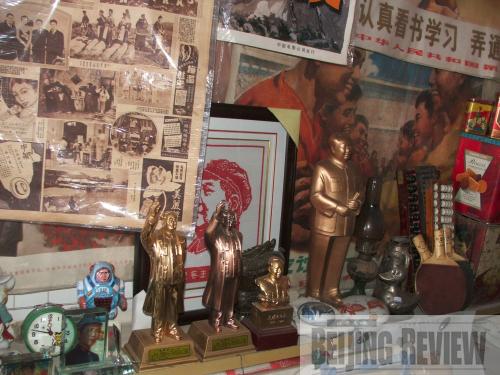|
 |
|
MAO MANIA: Collectors items featuring the former leader are proving to be a big hit during New China's 60th birthday year (FRANCISCO LITTLE) |
As the nation opens its arms to commemorate the 60th anniversary of the People's Republic of China on October 1, historic items spanning the past decades are changing hands with a fervor matching that of the Olympics' souvenir hunters.
And leading the memorabilia pack by a country mile is anything bearing the familiar face of Chairman Mao Zedong.
Whether the revered leader is adorning a porcelain bust, silk scarf, coffee mug or the face of a wristwatch, makes no difference to collectors, as sales seem to indicate quantity slams quality every time. It's known as the "red collection" and can include a range of historic items that represent the People's Republic in its first 30 years.
Visit any tourist site across Beijing and before you can say red star an enterprising tout is bound to offer you a Mao pin, pen or pendant.
Likewise every gift shop across the city worth its salt has invested in Mao.
Down on the trading floor of Beijing's massive Panjiayuan Market entire shops are dedicated to Mao souvenirs. In one, I spotted a collection of Mao badges. The shop owner rose from his slumber and beamed at me.
"Chairman Mao everywhere," he said, waving his arm in an expansive gesture. He was right.
Prices are not cheap by any means. The owner, who identified himself as Mr. He, said he had noticed how demand for Mao items had risen in the past year, but especially as the October 1 celebration drew closer.
It is almost like people wanted Mao around them when they celebrated the big day, he mused.
A large brass bust of Mao overshadowed ceramic statues of him saluting in the familiar stiff arm pose against a backdrop of carefully stacked Little Red Books. Although these books are copies and are ubiquitous around Beijing, Mr. He said anyone lucky enough to find a mint condition edition of Mao's quotations will pay an arm and a leg. He lowered his voice conspiratorially, looked around slowly for effect and said he could get me the real deal for $1,000 even money. I declined, saying I already had a copy. He sniffed the air unimpressed.
The shop had a shrine-like feel and on second glance the owner even looked a bit like Mao. Or was that his ghost lurking about admiring all the kit.
I bought a small Mao tin pin badge for 25 yuan ($3.7). The ceramic statues were selling for 200 yuan ($29.5). Porcelain versions could fetch prices of anything up to $3,000, and are much sought after by serious collectors.
The book section of the market is festooned with Mao posters, going for $3 each. I watched as a foreign buyer bought out the entire stock of what looked like at least 100 posters from one shop. The seller showed no emotion as she pocketed the wad of notes and I wondered if this kind of sale happened daily.
"What are you going to do with them?" I asked the buyer. "Sell them in Amsterdam, and also use them for wallpaper," he said smiling. He also showed me a nicely bound collection of Mao's selected poems that he picked up for $3, a gift for a friend back home.
Across town at the more trendy 798 Art District, Mao items compete with other arty gifts. One gallery sells canvas backpacks prominently displaying a picture of Mao. Below his image is the famous slogan "Serve the People," in Mao's handwriting. The packs sell for $30. Storekeeper Kathy said young people were buying the packs to use as fashion handbags. She said her "red" sale items were brisk this year, as people want to identify with the 60th anniversary. "Young people think Mao is cool," she said shyly.
Online, sales for red items can be found on countless websites from local expat blogs selling cufflinks for $75 to Amazon.com offering collectors posters for under $30.
As I was paying for my lighter, I realized that Mao's image is seen daily on perhaps the most important item of life in China—the currency. He stared up at me as I handed over a red 100-yuan note.
One thing is certain, and that's that the former leader is big business, whichever way you look at it, and you can take that to the bank.
The author is a South African living in Beijing | 